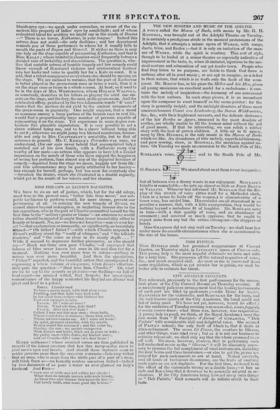MISS PHILLIPS AS RIENZI'S DAUGHTER.
WE have to do an act of justice, which, but for the old adage, most true in the present case, "better late than never," our cul- pable tardinesss to perform would, for mere shame, prevent our performing at all. in noticing the new tragedy of .Rienzi, we sinned almost beyond redemption, in neglecting honour due to the fair apparition, who in the part of Claudia committed herself for the first time to the " million's praise or blame"—an omission we would rather should be imputed to aught than to our insensibility either to beauty or to merit. N o, no—we have not forgotten—can we ever for:- get ?—that exclamation so innocently, so significantly,so beautifully uttered—" Oh father! father !"—with which Claudia responds to Rienzi's raillery about the "world of whispers," and "the tell-tale shadows," and " the voice so clear in its manly depth . ?" While it seemed to deprecate further pleasantry, as who should say—" Mock not thine own poor Claudia,"—it expressed that fulness of bliss never known but once in life and then but for a moment. Nothing was ever more true to nature—nothing in nature was ever more beautiful. And then the ejaculation, " Father!" repeated, and the beautiful action that accompanied it, expressing a whole volume of eloquence, when Rienzi affection- ately puts the question—" Dost love him, Claudia Y" Or, what are we to say to the accents so plaintive—so thrilling—so full of fond regret—so musical withal, that bespoke her never-dying remembrance of the happy contented life they led ere Rienzi was great and lived in a palace.
Rmsz. Claudia used
To hear a merry heart, with that clear voice Prattling., and that light busy foot astir In her small housewifery—the blithest bee That ever wrought is hive. CLAuo. Oh ! mine old hone! RIESZ. What ails thee, lady-bird ? CLAUD. Mine own, dear home !
Father, I love not this new state; these halls, Where comfort dies in VaSilleSS ; these trim maids, Whose service wearies me. Oh ! mine old home ! My quiet, pleasant chamber, with the myrtle Woven round the casement ; and the cedar by, Shading the sun : my garden overgrown With flowers and herbs, thick-set as crass in fields ; My pretty snow-white doves, my kindest nurse, And old Camillo—Ohl mine own dear home !
Happy authoress ! whose sweetest verses are thus published in accents of the fairest creature that has this many-a-day risen to glad men's eyes and hearts. And should these raptures seem to colder persons more than the occasion warrants—believing withal that no man, who is more than the ninth part of a part of a man, will think them so—we honestly confess ourselves bribed—bribed by two diamonds of as pure a water as ever glanced on lady's forehead. And then-
" Such war of white and red within her cheeks !
What stars do spangle heaven with such beauty,
As those two eyes become that heavenly face?—
'air lovely maid, once more good day to thee."


















 Previous page
Previous page